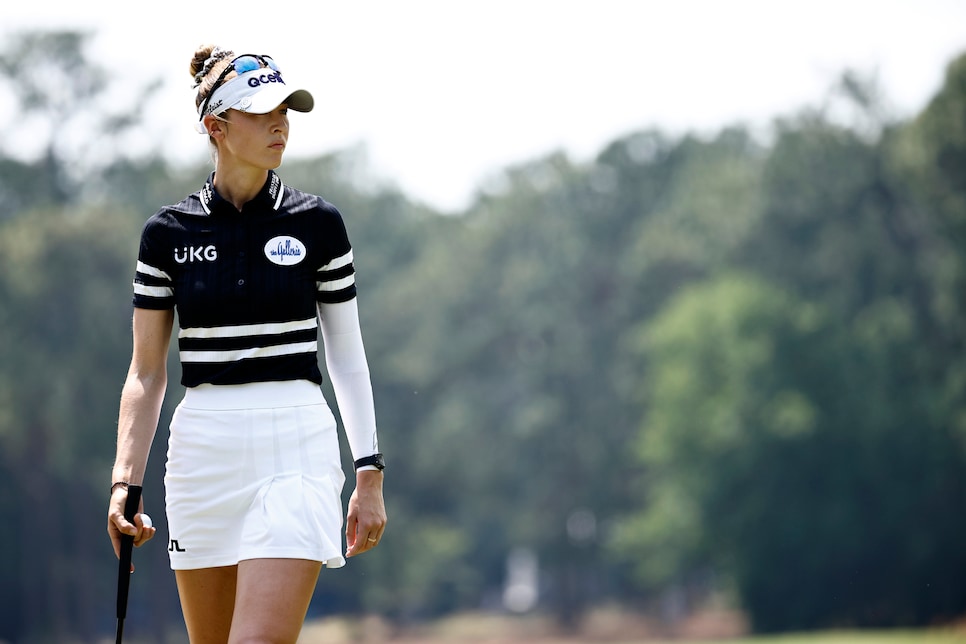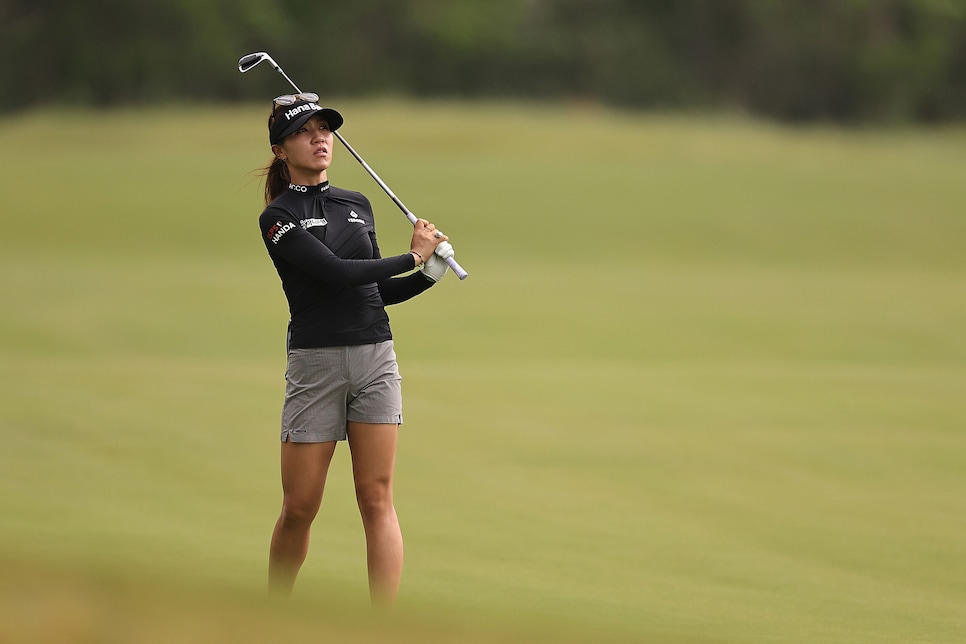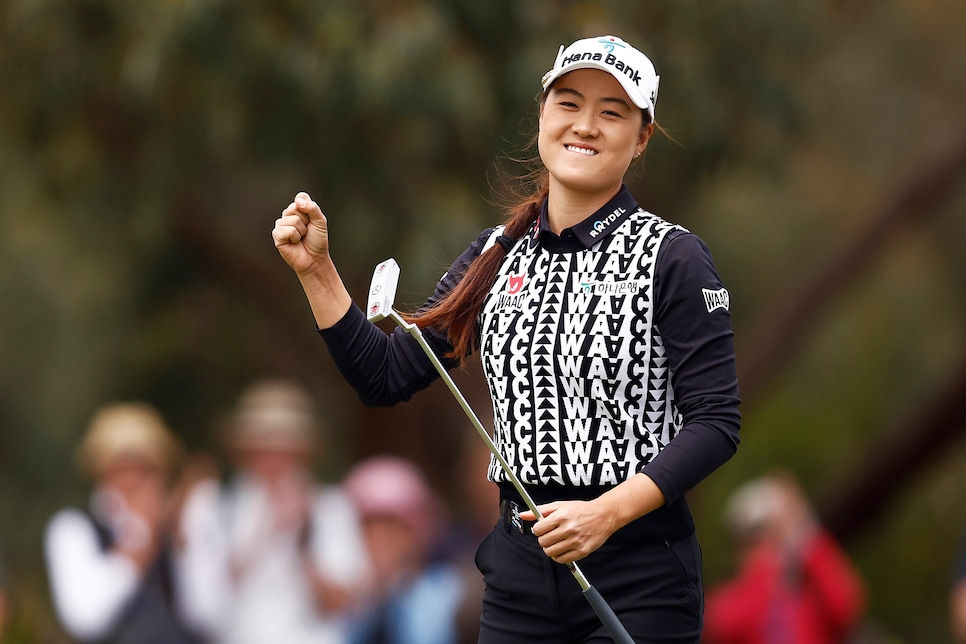The Hanwha LifePlus International Crown makes its return to the LPGA Tour this week, five years after the last (and what some feared would be the final) playing. The four-day teams matchplay event, being held for the first time at TPC Harding Park in San Francisco, pits multiple countries against each other in a tournament format unlike what you’ll find in the Ryder Cup or Solheim Cup… or any other in professional golf.
Think World Cup soccer meets matchplay.
Given this event’s quirks and notable format changes come the final day of play, we offer this primer to get you up to speed on everything you’ll see this week in California.
How did the International Crown come about?
On January 28, 2013, the LPGA announced the debut of a second women’s team event, joining the Solheim Cup, to showcase the worldwide strength of its talent (the Solheim Cup included only the US and European countries). Then commissioner Mike Whan summarised the tournament’s aim – and why “Crown” is part of the event’s name.
“At the LPGA, we celebrate great players from all over the world on a weekly basis, but this is the first time we’ll pit country versus country for global bragging rights,” Whan [below] said. “The International Crown will take women’s golf to the next level and allow fans to rally behind their homelands. In sports, there is simply nothing greater than wearing your nation’s flag, fans singing your national anthem, and bringing ‘the crown’ home.”

How many times has the International Crown been played?
This is the fourth playing of the event, the three previous coming in 2014, 2016 and 2018. The 2020 edition was set to be held in Centurion Club in England but was cancelled due to the COVID-19 pandemic. It was never rescheduled, but Hanwha came in as a title sponsor to help revive the event for 2023.
Who have been the previous winners?
Spain won the inaugural event in 2014 at Caves Valley Golf Club in Maryland. The US was victorious in 2016 at the Merit Club outside Chicago, while South Korea won in 2018 at Jack Nicklaus Golf Club in Incheon in their home country.
How many countries are in the event?
Eight countries compete this week. Here they are, in order of seeding: United States, South Korea, Japan, Sweden, England, Thailand, Australia, China.
How many players are on each team?
Four. Invitations went out to the top four players from each country off the Rolex Women’s Rankings. Then alternates were invited if players declined their spots. The Rolex Rankings also determined the replacements.
How were the teams decided?
At the conclusion of last year’s CME Tour Championship in November, the tour used the combined Rolex Women’s World Rankings positions of the top four players from each country that day to determine the eight countries that would compete.
How were the players and seedings finalised?
The LPGA used the Rolex Women’s Rankings after the DIO Implant LA Open on April 3, to finalise the players and seedings. Seedings used the top four players from the Rolex Rankings, regardless of whether or not they accepted an invite.
OK, now I know the seedings. So how do they get used?
They’re split into two pools: seedings 1, 4, 5, and 8 form Pool A, while seedings 2, 3, 6, and 7 form Pool B.
For this year’s Crown, they are:

Pool A
United States: Nelly Korda [above], Lexi Thompson, Lilia Vu, Danielle Kang
Sweden: Maja Stark, Madelene Sagstrom, Anna Nordqvist, Caroline Hedwall
England: Jodi Ewart Shadoff, Bronte Law, Alice Hewson, Liz Young
China: Xiyu Lin, Ruoning Yin, Yu Liu, Ruixin Liu
Pool B
South Korea: Jin Young Ko, Hyo-Joo Kim, In Gee Chun, Hye Jin Choi
Japan: Nasa Hataoka, Ayaka Furue, Yuka Saso, Hinako Shibuno
Thailand: Atthaya Thitikul, Patty Tavatanakit, Moriya Jutanugarn, Ariya Jutanugarn
Australia: Minjee Lee, Hannah Green, Stephanie Kyriacou, Sarah Kemp
Did any notable players this season miss out on the event?
Yes. Australia’s Grace Kim, the winner of the Lotte Championship in April, was 176th in the rankings the day the teams were finalised. That was two spots behind Sarah Kemp, who took the final position for the Aussies. If the teams got selected as of this week’s rankings, Kim would be in the third spot on the team.
Linn Grant, 24th in the Rolex Women’s Rankings and the top player from Sweden, remained unable to travel to the United States due to its international COVID-19 travel vaccine requirements. Caroline Hedwall replaced her.
And overnight, the LPGA announced that England’s Georgia Hall and Charley Hull, both ranked inside the top 20 in the Rolex Women’s Ranking, had withdrawn from the event due to injury/illness.

Wait and what about Lydia Ko [above] or Brooke Henderson? Why aren’t they playing?
Sadly for the Rolex Women’s Rankings No.2 and No.8, respectively, they didn’t have enough successful fellow Kiwis and Canadians to allow their countries to be among the top eight when teams were decided.
Ko is unlikely to see that change soon. The next highest ranked player from New Zealand is Momoka Koboi at 185th. However, Henderson has a better opportunity with countrywoman Maddie Szeryk marching up the rankings to No.204 after an impressive T-7 at the LPGA Drive On Championship and T-18 at the Chevron Championship. Maude-Aimee Leblanc (129) sits close to Szeryk in the rankings as well.
How does pool play work?
From Thursday to Saturday, teams will play four-ball round-robin within their pools. For example, on Thursday, the US will have two matches against China. On Friday, they’ll have two against England, and on Saturday, they’ll have their final two against Sweden. Each match is worth a point, with a tie worth half a point.
How are the players in each match determined?
For Thursday’s opening round, teams will fill out a piece of paper on Tuesday with who they want in each of their two matches and give it to the LPGA. After play each day, teams will have 30 minutes after returning to the clubhouse to fill in their sheets for the matches the next day. On Sunday, after the conclusion of the semi-finals, they’ll have 15 minutes to fill out the paperwork to decide the line-up for the championship and consolation matches.
How many teams advance out of pool play?
Four. The two teams with the most points from each pool will advance to Sunday morning’s semi-finals. It’s a change from previous versions of Crown, where a wild-card match between the two third-place teams in pool play determined the fifth and final team to advance out of pool play.
So what happens with the final four teams out of pool play?
There’s now a semi-final and final match on a revamped final day. Pool A’s winner will play the runner-up of Pool B, and vice versa, in three matches in the morning. There are two singles matches and one fourball match. The first team to get to two points wins their team match-up, with all matches extend to extra holes if they’re tied after 18.
The winner of each goes on to the final in the afternoon. The losers play a consolation match.
What’s different with Sunday this time versus the previous three Crowns?
The past three editions featured a Sunday single-match slugfest. The final five teams were reseeded, and every team had a one-on-one match against another.
However, the previous rules included accumulating all points from the week’s four-ball matches into the final day.
So, in 2018 (when two points were awarded for a win and one for a tie), South Korea led with 10 points. Thailand, in fifth, had five points. A perfect day would bring them to 13, an immense gap to cover with so many teams in front of them. South Korea secured the victory with 15 points.
What is the purse for the International Crown, and how much does each winning team member get?
Total purse is $US2 million. Here’s the breakdown of the prizemoney (in US dollars) for each team/player:
Winner: $500,000/$125,000 per player
Second: $330,000/$75,900
Third: $280,000/$64,400
Fourth: $240,000/$55,200
Fifth: $185,000/$42,550
Sixth: $170,000/$39,100
Seventh: $155,000/$35,650
Eighth: $140,000/$32,200
How many teams have played in all four Crowns?
Five: the US, Thailand, South Korea, Japan and Australia. No country is making its debut this week.

How many players have played in all four Crowns?
Four: Lexi Thompson (US), Ariya Jutanugarn and Moriya Jutanugarn (Thailand), and Minjee Lee (Australia) [above].
Has an amateur ever played in International Crown?
Yes. Minjee Lee in 2014 was an amateur ranked 78th in the world, good for the second spot on the Australian team.



